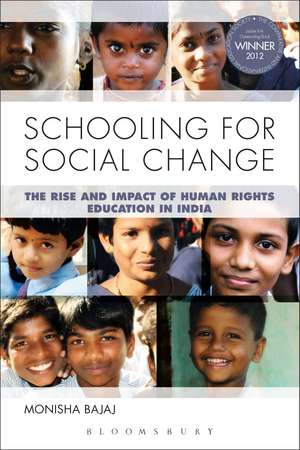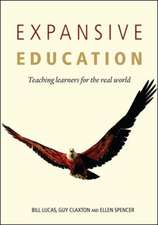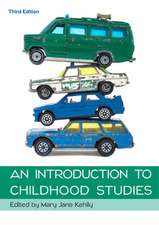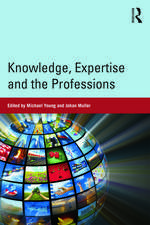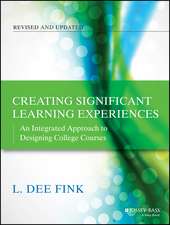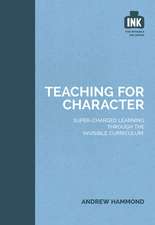Schooling for Social Change: The Rise and Impact of Human Rights Education in India
Autor Professor Monisha Bajajen Limba Engleză Hardback – 25 ian 2012
This enlightening book offers an instructive case study of how international mandates and grassroots activism can work together.
Bajaj shows how the Institute of Human Rights Education has gained significant momentum for school-based adoption, textbook reform, and policy changes in a nation-state still struggling to ensure universal access to education. Schooling for Social Change provides a wealth of analysis from the frontlines of education reform and will be of interest to all those working in international and comparative education, human rights, and South Asian development.
Preț: 772.17 lei
Preț vechi: 1111.97 lei
-31% Nou
Puncte Express: 1158
Preț estimativ în valută:
147.75€ • 161.00$ • 124.50£
147.75€ • 161.00$ • 124.50£
Carte tipărită la comandă
Livrare economică 23 aprilie-07 mai
Preluare comenzi: 021 569.72.76
Specificații
ISBN-13: 9781441176745
ISBN-10: 1441176748
Pagini: 208
Ilustrații: 10
Dimensiuni: 157 x 231 x 18 mm
Greutate: 0.43 kg
Editura: Bloomsbury Publishing
Colecția Continuum
Locul publicării:New York, United States
ISBN-10: 1441176748
Pagini: 208
Ilustrații: 10
Dimensiuni: 157 x 231 x 18 mm
Greutate: 0.43 kg
Editura: Bloomsbury Publishing
Colecția Continuum
Locul publicării:New York, United States
Caracteristici
Awarded the 2012 Jackie Kirk Outstanding Book Award by the Comparative and International Education Society
Notă biografică
Monisha Bajaj is Associate Professor of Education in the Department of International and Transcultural Studies at Teachers College, Columbia University.
Cuprins
Chapter One: Introduction Chapter Two: Historical Development, Multiple Definitions, and Ideological Orientations of Human Rights Education
Chapter Three: Policy, Pedagogy, and Practice: The Emergence and Landscape of Human Rights Education in IndiaChapter Four: Linking Laws, Liberties, and Learning: The Institute of Human Rights Education
Chapter Five: From 'Time Pass' to Transformative Force: Human Rights Education for Marginalized Youth
Chapter Six: Building Solidarity and Coalitional Agency through Human Rights Education
Chapter Seven: Teachers and Textbooks as Legitimating Agents for Human Rights
Chapter Eight: Challenges, Co-optations, and Contestations: Indian Human Rights Education in Focus
Chapter Nine: Conclusion
Bibliography
Index
Index
Recenzii
"Professor Bajaj has done a most impressive multi-level study of a major human rights education program in India. She traces her case from the national level down to individual teachers and students. The book will be essential for those interested in civics and human rights education as these fields evolve in developing countries. It will also be of great interest to students of Indian society and education more generally." John W. Meyer, Professor of Sociology, Emeritus, Stanford University
"Bajaj's inspiring story of human rights education in India demonstrates the transformative possibilities of schooling for some of the world's most marginalized youth. Based on extensive fieldwork, she shows how students themselves enact rights-based advocacy to change lives. This book is essential reading for human rights activists, educators, and students seeking to understand the dynamics of social exclusion and how youth and their 'coalitional agents' can alter patterns of structural violence." - Frances Vavrus, McKnight Presidential Fellow, Associate Professor, University of Minnesota
"In this major contribution to sparse scientific writing concerning human rights education, Monisha Bajaj helps us understand the complex and contradictory relationship between 'laws, liberties, and learning.' Not the mandates of the experts but the voices of the learned constitute the narratives of Indian activists' self-determination in devising human rights learning strategies. This work should be of compelling interest for all the votaries of the right to human rights education as the most precious of all fundamental human rights." -Upendra Baxi, Professor Emeritus, University of Warwick and Delhi
"I welcome the publication of this research study, a significant contribution to the World Programme for Human Rights Education (2005-ongoing). This study illustrates the power of methodologically-sound human rights education as a means to great ends, notably the realization of human rights and social justice in our communities. I encourage academics and higher education institutions to develop this type of research, a useful undertaking to advance the human rights cause." - Navanethem Pillay, United Nations High Commissioner for Human Rights
"Bajaj's inspiring story of human rights education in India demonstrates the transformative possibilities of schooling for some of the world's most marginalized youth. Based on extensive fieldwork, she shows how students themselves enact rights-based advocacy to change lives. This book is essential reading for human rights activists, educators, and students seeking to understand the dynamics of social exclusion and how youth and their 'coalitional agents' can alter patterns of structural violence." - Frances Vavrus, McKnight Presidential Fellow, Associate Professor, University of Minnesota
"In this major contribution to sparse scientific writing concerning human rights education, Monisha Bajaj helps us understand the complex and contradictory relationship between 'laws, liberties, and learning.' Not the mandates of the experts but the voices of the learned constitute the narratives of Indian activists' self-determination in devising human rights learning strategies. This work should be of compelling interest for all the votaries of the right to human rights education as the most precious of all fundamental human rights." -Upendra Baxi, Professor Emeritus, University of Warwick and Delhi
"I welcome the publication of this research study, a significant contribution to the World Programme for Human Rights Education (2005-ongoing). This study illustrates the power of methodologically-sound human rights education as a means to great ends, notably the realization of human rights and social justice in our communities. I encourage academics and higher education institutions to develop this type of research, a useful undertaking to advance the human rights cause." - Navanethem Pillay, United Nations High Commissioner for Human Rights
